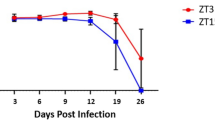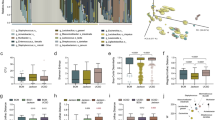Infectious process even at the initial stage after aerosol infection with Mycobacterium tuberculosis induced rapid changes in vaginal microbiota in mice. Rapid decrease in both the quantity and diversity of microbiota was noted, and then, partial recovery of normal flora was observed. Changes in vaginal microbiota was detected as soon as in 3-7 days after lung infection, while inflammatory changes appeared by day 35. At the early stage of infection, no signs of inflammation were observed, neither M. tuberculosis nor its DNA were detected in mouse genital organs.
Similar content being viewed by others
References
Voroshilina ES, Tumbinskaya LV, Donnikov AE, Plotko EA, Khayutin LV. Vaginal biocenosis in the context of view of quantitative polymerase chain reaction: what is its norm? Akush. Gin. 2011;(1):57-65. Russian.
Sukhikh GT, Kayukova SI, Bocharova IV, Donnikov AE, Lepekha LN, Demikhova OV, Uvarova EV, Berezovskii YS, Smirnova TG. Peculiarities of the Inflammatory Process in the Reproductive Organs of C57Bl/6 Female Mice with Experimental Tuberculosis.. Bull. Exp. Biol. Med. 2016;160(6):787-790.
Chackerian AA, Alt JM, Perera TV, Dascher CC, Behar SM. Dissemination of Mycobacterium tuberculosis is influenced by host factors and precedes the initiation of T-cell immunity. Infect. Immun. 2002;70(8):4501-4509.
Gill N, Wlodarska M, Finlay BB. The future of mucosal immunology: studying an integrated system-wide organ. Nat. Immunol. 2010;11(7):558-560.
Lenaerts AJ, Gruppo V, Marietta KS, Johnson CM, Driscoll DK, Tompkins NM, Rose JD, Reynolds RC, Orme IM. Preclinical testing of the nitroimidazopyran PA-824 for activity against Mycobacterium tuberculosis in a series of in vitro and in vivo models. Antimicrob. Agents Chemother. 2005;49(6):2294-2301.
Marrazzo JM. Vaginal biofilms and bacterial vaginosis: of mice and women. J. Infect. Dis. 2013;207(10):1481-1483.
Martin DH, Marrazzo JM. The vaginal microbiome: current understanding and future directions. J. Infect. Dis. 2016;214(Suppl. 1):S36-S41.
Mayer BT, Srinivasan S, Fiedler TL, Marrazzo JM, Fredricks DN, Schiffer JT. Rapid and profound shifts in the vaginal microbiota following antibiotic treatment for bacterial vaginosis. J. Infect. Dis. 2015;212(5):793-802.
Nikonenko BV, Samala R, Einck L, Nacy CA. Rapid, simple in vivo screen for new drugs active against Mycobacterium tuberculosis. Antimicrob. Agents Chemother. 2004;48(12):4550-4555.
Orme I; Tuberculosis Drug Screening Program. Search for new drugs for treatment of tuberculosis. Antimicrob. Agents Chemother. 2001;45(7):1943-1946.
Pascual L, Ruiz F, Giordano W, Barberis IL. Vaginal colonization and activity of the probiotic bacterium Lactobacillus fermentum L23 in a murine model of vaginal tract infection. J. Med. Microbiol. 2010;59(Pt 3):360-364.
Tyagi S, Nuermberger E, Yoshimatsu T, Williams K, Rosenthal I, Lounis N, Bishai W, Grosset J. Bactericidal activity of the nitroimidazopyran PA-824 in a murine model of tuberculosis. Antimicrob. Agents Chemother. 2005;49(6):2289-2293.
Winglee K, Eloe-Fadrosh E, Gupta S, Guo H, Fraser C, Bishai W. Aerosol Mycobacterium tuberculosis infection causes rapid loss of diversity in gut microbiota. PLoS One. 2014;9(5). ID e97048. doi: 10.1371/journal.pone.0097048.
Author information
Authors and Affiliations
Corresponding author
Additional information
Translated from Byulleten’ Eksperimental’noi Biologii i Meditsiny, Vol. 167, No. 5, pp. 586-590, May, 2019
Rights and permissions
About this article
Cite this article
Kayukova, S.I., Donnikov, A.E., Bocharova, I.V. et al. Changes in Microbiota and Development of Nonspecific Inflammation of Genitals in Female C57Bl/6 Mice after Aerosol Infection with Mycobacterium tuberculosis. Bull Exp Biol Med 167, 645–649 (2019). https://doi.org/10.1007/s10517-019-04589-8
Received:
Published:
Issue Date:
DOI: https://doi.org/10.1007/s10517-019-04589-8




